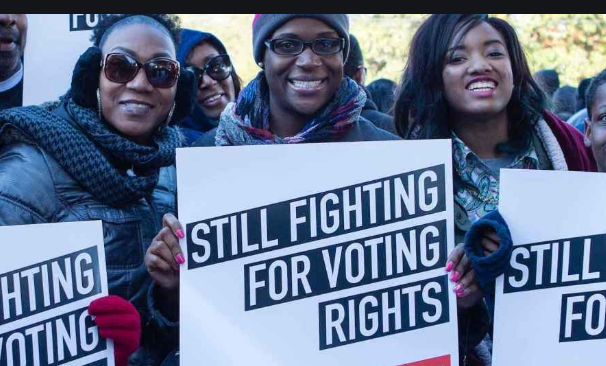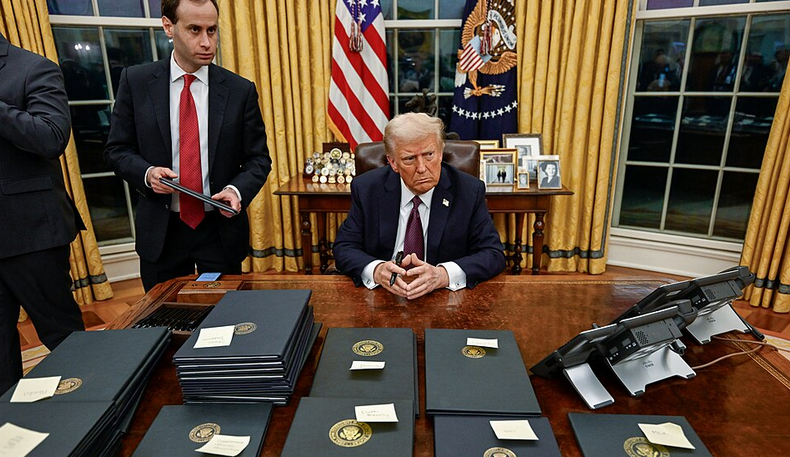[Pennsylvania\Voter Suppression]
Kenneth L. Huston: “Voter suppression will not be tolerated in Pennsylvania. Everyone who submitted a ballot has a right to have it counted…This is what democracy represents.”
Photo: ACLU Pennsylvania
Voting rights organizations are fighting back against an attempt by Republican candidates in Pennsylvania to invalidate valid ballots cast by eligible voters.
State representative candidate Joseph Hamm and U.S. Rep. Mike Kelly, along with four voters, filed a lawsuit in Commonwealth Court on Election Day, claiming that county election officials who were following guidance from the Pennsylvania Department of State had violated state election law by notifying voters that their mail-in ballots had been rejected.
The petitioners asked the court to invalidate all provisional or replacement ballots cast by Pennsylvania voters whose mail-in ballots were canceled, and all mail-in ballot that were “cured” after voters were notified about a problem with their initial ballot.
In an amicus brief Thursday, leading organizations representing voters came together to oppose this attempt to deprive Pennsylvanians of the opportunity to cast a valid ballot. The brief was filed by amici the Black Political Empowerment Project, Common Cause Pennsylvania, the League of Women Voters of Pennsylvania, and NAACP Pennsylvania State Conference.
These organizations were represented by the American Civil Liberties Union, ACLU of Pennsylvania, Lawyers’ Committee for Civil Rights Under Law, the Public Interest Law Center, and pro bono counsel from Covington & Burling.
“This attempt to disenfranchise Pennsylvania voters must be rejected,” the brief reads. “Nothing in the Election Code prohibits a county board of elections from providing notice that a voter’s mail-in ballot has been rejected so that the voter can be contacted and afforded an opportunity to cast a valid ballot.”
A mail-in ballot can be canceled when the voter made certain technical mistakes, such as not using a secrecy envelope. By notifying voters that their ballots cannot be accepted, the amici assert, Pennsylvania counties have given voters a chance to make their voice heard. Invalidating provisional ballots would eliminate the only recourse that voters whose mail-in ballots would be rejected have to be able to participate in the election.
Groups involved in the brief shared the following statements:
“Every vote counts, and this latest effort to discard valid ballots in Pennsylvania should be rejected,” said Sophia Lin Lakin, deputy director of the ACLU’s Voting Rights Project. “Every voter must have their voice heard. No more shenanigans by those who oppose this foundational principle of our democracy.”
“The candidates in this lawsuit have a nonsensical interpretation of the law. But more importantly, if they succeed, some voters will be disenfranchised,” said Witold Walczak, legal director of the ACLU of Pennsylvania. “There is nothing in Pennsylvania law that suggests that a voter can’t fix an error with their mail ballot. These voters should have their valid ballots counted.”
“Pennsylvania voters are entitled to vote by mail and have an opportunity to cure any defects that are detected,” said Derrick Johnson, president and CEO of the NAACP. “If county officials have committed error here, the penalty should not be to disenfranchise the voter for someone else’s mistakes. The right to vote is sacred and must be preserved at all costs. These voters are entitled to cast provisional ballots and have their votes count.”
“Voter suppression will not be tolerated in Pennsylvania,” says the NAACP Pennsylvania State Conference President Kenneth L. Huston. “Everyone who submitted a ballot has a right to have it counted. That was the reason time was taken to submit mail in ballots. It is the intention of those responsible for counting ballots to make sure that all ballots are counted. This reflects the voice of the people. This is what democracy represents.”
“The mission of the Black Political Empowerment Project (B-PEP) since 1986 has been to encourage African-American voter turnout, and we encourage all people to vote in each and every election,” said Tim Stevens, chairman and CEO of the Black Political Empowerment Project. “Any action that discourages voters from having the opportunity to express their choice goes against the heart of our mission. This include having the opportunity to correct any technical mistakes they may have made completing their ballot.”
“Voters’ voices must be heard, whether they vote in person, by mail, or needed to cast a provisional ballot. Pennsylvania’s voters don’t deserve to have their ballots called into question by last-minute litigation filed for purely partisan reasons,” said Suzanne Almeida, interim executive director of Common Cause Pennsylvania. “The process of notifying and allowing voters to fix mistakes on their ballots should not be controversial.”
“The League fought to establish a fair signature match practice in Pennsylvania last August because voters should not be disenfranchised because of a technical error,” said Terrie Griffin, co-president of the League of Women Voters of Pennsylvania. “Pennsylvania’s effort to reach out to voters to fix technical issues should be applauded. It is unthinkable that the outreach efforts would be disrupted now—after all the ballots have been cast. Voters deserve to have their votes counted.”
“This lawsuit is nothing more than an attempt to silence and disenfranchise eligible voters,” said John Powers, attorney at the Lawyers’ Committee for Civil Rights Under Law. “County election officials have acted entirely lawfully here. The court should reject this meritless and unfortunate attempt to impugn local officials’ good work in this election.”
“Pennsylvania’s Election Code and its Constitution call for more, not less voter participation,” said Ben Geffen, staff attorney at the Public Interest Law Center. “The efforts by some county officials to notify voters that their mail-in ballots had been rejected were not only completely lawful, but were laudable. No one should lose their vote because of a fixable error.”
Read the amicus brief here.







